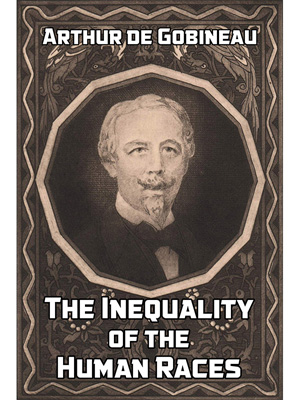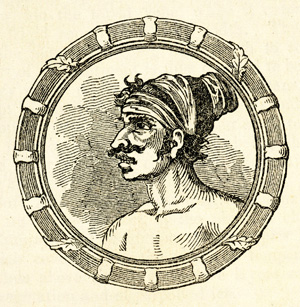(Count) Joseph Arthur de Gobineau, Essay on the Inequality of the Human Races (1853), extracts
The fall of civilizations is
at once the most striking and obscure of all historical phenomena. Inspiring
the mind with terror, it is a calamity so majestic and
inscrutable that the thinker never tires of it. ... When we perceive that,
after a period of strength and glory, all human societies come to decline
and fall, all of them, I say, without exception; when we become aware with
what fearful silence the earth displays upon its surface the debris of the
civilizations that preceded our own... when the mind, reverting to our
modern states, takes the measure of their extreme youth and recognizes that
some, having arisen but yesterday, are already in a state of decrepitude;
then we acknowledge, not without a shudder ... how rigorously the word of
the prophets on the instability of all things applies to peoples--to peoples
no less than to states, to states no less than to individuals..
mind with terror, it is a calamity so majestic and
inscrutable that the thinker never tires of it. ... When we perceive that,
after a period of strength and glory, all human societies come to decline
and fall, all of them, I say, without exception; when we become aware with
what fearful silence the earth displays upon its surface the debris of the
civilizations that preceded our own... when the mind, reverting to our
modern states, takes the measure of their extreme youth and recognizes that
some, having arisen but yesterday, are already in a state of decrepitude;
then we acknowledge, not without a shudder ... how rigorously the word of
the prophets on the instability of all things applies to peoples--to peoples
no less than to states, to states no less than to individuals..
Peoples perish because they are degenerate and for no other reason.... No
longer able to withstand blows or to pick themselves up after suffering
them, they place before us the spectacle of their death throes. If they die,
it is because they no longer possess the vigor that their ancestors had in
passing through the dangers of life. ... How and why is that vigor lost?
That is what we need to know. How does a people degenerate? That is what we
must explain...
The word degenerate, when applied to a people, means (as it ought to mean)
that the people has no longer the same intrinsic value as it had before,
because it has no longer the same blood in its veins, continual
adulterations having gradually affected the quality of that blood. In other
words, though the nation bears the name given by its founders, the name no
longer connotes the same race ; in fact, the man of a decadent time, the
degenerate man properly so called, is a different being, from the racial
point of view, from the heroes of the great ages. I agree that he still
keeps something of their essence; but the more he degenerates, the thinner
does this "something " become. ...He is only a very distant kinsman of those
he still calls his ancestors. He, and his civilization with him, will
certainly die on the day when the primordial race-unit is so broken up and
swamped by the influx of foreign elements, that its effective qualities no
longer exercise sufficient influence. [In this book, I will show by
examples] that great peoples, at the moment of their death, share only a
very small and insignificant amount of the blood of their founders and...
thereby have explained clearly enough how it is possible for civilizations
to fall—the reason being that they are no longer in the same hands.
...
Generally the dominating peoples begin by being far fewer in number than
those they conquer; on the other hand, certain races that form the basis of
the population in immense districts are extremely prolific—the Celts, for
example, and the Slavs. This is another reason for the rapid disappearance
of the conquering races. Their greater activity and the more personal part
they take in the affairs of the State make them the chief mark for attack
after a disastrous battle, a proscription, or a revolution. Thus, while by
their very genius for civilization they collect round them the different
elements in which they are to be absorbed, they are the victims, first of
their original smallness of number, and then of a host of secondary causes
which combine together for their destruction. ...
...I have now given meaning to the word "degeneration"; and so have been
able to show how a nation loses its vitality. I must next proceed to prove
what for the sake of clearness I have had to put forward as a mere
hypothesis; namely, that there are real differences in the relative value of
human races. The consequences of proving this will be considerable, and
cover a wide field. But first I must lay a foundation of fact and argument
capable of holding up such a vast building...
 The idea of an original, clear-cut, and permanent inequality among the
different races is one of the oldest and most widely
held opinions in the world. [and yet today it is often challenged] "All
men," say the defenders of human equality, "are furnished with similar
intellectual powers, of the same nature, of the same value, of the same
compass." These are not perhaps their exact words, but it is certainly the
right meaning. So the brain of the Huron Indian contains in an undeveloped
form an intellect which is absolutely the same as that of the Englishman or
the Frenchman! Why then, in the course of the ages, has he not invented
printing or steam power? I should be quite justified in asking our Huron
why, if he is equal to our European peoples, his tribe has never produced a
Caesar or a Charlemagne among its warriors....The difficulty is usually met
by the blessed phrase, "the predominating influence of environment."
According to this doctrine, an island will not see the same miracles of
civilization as a continent, the same people will be different in the north
from what it is in the south, forests will not allow of developments which
are favored by open country. What else? The humidity of a marsh, I suppose,
will produce a civilization which would inevitably have been stifled by the
dryness of the Sahara! However ingenious these little hypotheses may be, the
testimony of fact is against them. In spite of wind and rain, cold and heat,
sterility and fruitfulness, the world has seen barbarism and civilization
flourishing everywhere, one after the other, on the same soil.
The idea of an original, clear-cut, and permanent inequality among the
different races is one of the oldest and most widely
held opinions in the world. [and yet today it is often challenged] "All
men," say the defenders of human equality, "are furnished with similar
intellectual powers, of the same nature, of the same value, of the same
compass." These are not perhaps their exact words, but it is certainly the
right meaning. So the brain of the Huron Indian contains in an undeveloped
form an intellect which is absolutely the same as that of the Englishman or
the Frenchman! Why then, in the course of the ages, has he not invented
printing or steam power? I should be quite justified in asking our Huron
why, if he is equal to our European peoples, his tribe has never produced a
Caesar or a Charlemagne among its warriors....The difficulty is usually met
by the blessed phrase, "the predominating influence of environment."
According to this doctrine, an island will not see the same miracles of
civilization as a continent, the same people will be different in the north
from what it is in the south, forests will not allow of developments which
are favored by open country. What else? The humidity of a marsh, I suppose,
will produce a civilization which would inevitably have been stifled by the
dryness of the Sahara! However ingenious these little hypotheses may be, the
testimony of fact is against them. In spite of wind and rain, cold and heat,
sterility and fruitfulness, the world has seen barbarism and civilization
flourishing everywhere, one after the other, on the same soil.
...
We often hear of negroes who have learnt music, who are clerks in
banking-houses, and who know how to read, write, count, dance, and speak,
like white men. People are astonished at this, and conclude that the negro
is capable of everything! And then, in the same breath, they will express
surprise at the contrast between the Slav civilization and our own. The
Russians, Poles, and Serbians (they will say), even though they are far
nearer to us than the negroes, are only civilized on the surface; the higher
classes alone participate in our ideas, owing to the continual admixture of
English, French, and German blood. The masses, on the other hand, are
invincibly ignorant of the Western world and its movements, although they
have been Christian for so many centuries—in many cases before we were
converted ourselves! The solution is simple. There is a great difference
between imitation and conviction. Imitation does not necessarily imply a
serious breach with hereditary instincts; but no one has a real part in any
civilization until he is able to make progress by himself, without direction
from others. What is the use of telling me how clever some particular
savages are in guiding the plough, in spelling, or reading, when they are
only repeating the lessons they have learnt ? Show me rather, among the many
regions in which savages have lived for ages in contact with Europeans, one
single place where the religious doctrines, the
ideas, customs, and institutions of even one European people have been so
completely assimilated that progress in them is made as naturally and
spontaneously as among ourselves. Show me a place where the introduction of
printing has had results, similar to those in Europe, where our sciences are
brought to perfection, where new applications are made of our discoveries,
where our philosophies are the parents of other philosophies, of political
systems, of literature and art, of books, statues, and pictures!